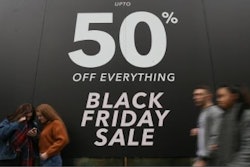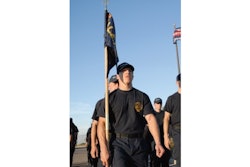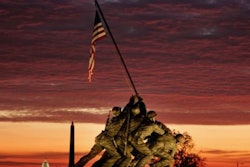It was inevitable. It was unavoidable. It was merely a matter of time. And now, it is reality. Widespread bedlam centered around looting of retail stores of everything from shaving cream to high-end luxury handbags has led to the senseless murder of an innocent human being.
On the day before Thanksgiving, a retired police officer working as an armed security guard was helping to protect a local television news crew reporting on the dramatic increase in violence associated with organized retail crime taking place in the San Francisco Bay Area, when he himself became a victim of a violent crime.
Kevin Nishita reportedly intervened when an assailant attempted to rob the KTVU-TV news crew covering a story about a recent robbery during which a dozen thieves wearing masks and hoodies raided a clothing store in downtown Oakland. The assailant allegedly shot Nishita in the abdomen and fled the scene in a white four-door sedan—at the time of this writing, the suspect remains at large.
Prior to working as a guard, he served as a police officer at the Oakland Housing Authority, Hayward, San Jose, and Colma police departments, where he retired as a sergeant in 2018.
Nishita died from his injuries Saturday morning. He leaves behind a wife, two children, three grandchildren, and countless colleagues (past and present) who will never again see his smiling face.
This column is dedicated to the life and legacy of Sergeant (ret) Kevin Nishita.
A Word About Words
First and foremost, let's examine the language of the day.
Some "Social Justice Experts" have cautioned against using the term "looting" to describe the rash of thefts taking place from coast to coast. Let's briefly entertain that suggestion and contemplate some alternatives.
Lorenzo Boyd—Professor of Criminal Justice and Community Policing at the University of New Haven and a retired veteran police officer—told a local San Francisco Bay Area news outlet that looting "is a term that we typically use when people of color or urban dwellers are doing something. We tend not to use that term for other people when they do the exact same thing."
I disagree with Boyd's attempt to tie the act of "looting" to a specific racial group, but okay. He's got an advanced degree and a career as a cop on which he bases his conclusion, so okay.
In my opinion, however, a better assertion is that the term "looting" best describes the mass robbery of an abandoned area during a declared national disaster—spontaneous convulsions of criminality found at the nexus of desperate need and sudden opportunity. After all, amid total societal breakdown and genuine fear of perishing from this earth, adherence to laws and mores understandably become secondary to survival.
Searching my brain for another term to describe the current criminal landscape of retail thievery en masse I come up with "plundering" and "pillaging" but both of those words evoke images of victorious Vikings (were there any other kind of Vikings?) reaping the spoils of war.
So, in lieu of "looting" or "plundering" or "pillaging" perhaps we can agree on something along the lines of "organized retail theft." This is the term favored by the National Retail Federation, which according to its website "passionately stands up for the people, policies and ideas that help retail thrive."
It would appear from current events that these events from San Francisco's Union Square, LA's Grove, Chicago's Magnificent Mile, New York's Fifth Avenue, and elsewhere that these events are intricately planned and executed with the objective of stealing goods that can be subsequently sold for profit on the black market. They are, in essence and in reality, organized crime.
By approaching this type of crime as organized, perhaps a sufficiently motivated prosecutor's office in San Francisco, LA, Chicago, or New York might even be able to pursue a RICO charge or two.
What am I thinking? That assumes the existence of a sufficiently motivated prosecutor's office in San Francisco, LA, Chicago, or New York.
Silly me.
The Maddening of America
Now, back to our regularly scheduled programming.
According to the abovementioned National Retail Federation (NRF) the financial impact of organized retail crime (ORC) in 2020, is an average of $719,548 per $1 billion dollars in sales.
That's madness.
The NRF says that the top cities in the United States affected by ORC-related incidents are:
- Los Angeles
- Chicago
- Miami
- New York
- San Francisco
- Baltimore
- Atlanta
- Washington, DC
- Philadelphia
- Sacramento
The NRF surveyed retailers across the country (including in the abovementioned cities) on the topic and found that most respondents believe that "the increase in ORC-related incidents may be a result of changing laws and penalties for shoplifting" and that more than 60% of respondents believe a federal ORC law is needed to effectively combat this issue.
I'm not a huge fan of making retail theft a federal matter, but I'd at least listen to the argument. Meanwhile, working to resolve this matter now falls—and rightly so in my opinion—on local and state law enforcement.
However, police in places that have been devastated by the recent spike in this sort of crime are hamstrung by a failure to prosecute these offenders. Recidivism is rampant because there is no serious penalty—in some cases, no penalty at all—for the offense.
Arrests are rarely made and when they are, the violators are out of jail before the ink on the paperwork is dry.
It's enough to make you want to tear your teeth out.
I Told You So
Observers—including yours truly—have howled for years now that the defunding the police, de-policing in crime-prone areas, and de-criminalizing criminal behavior would lead to the mayhem we're presently witnessing.
Over the years I've written many times that de-policing/de-funding would lead to society looking a lot like a combination of Mad Max and The Purge—lawlessness and mayhem abounding with criminals ruling the streets as police withdraw.
In August 2018 I wrote, "Nature hates a vacuum. When the police exit the arena, the bad guys enter it—that's just simple physics. Every manner of crime will increase. Private citizens will take up arms in their own defense. This will inevitably lead to some innocent person getting needlessly killed. It will probably be a security guard or a citizen responder seeking to fill the void left by the police who have been litigated out of effectiveness or legislated out of existence."
I take no joy whatsoever in essentially predicting the murder of Kevin Nishita—anyone with half a brain could have seen that coming—and I take no pleasure in offering up another prediction for you.
There will be more bloodshed.
The fallout of things like California's Prop 47—which turns theft of $1,000 in goods from a felony to a misdemeanor—and ongoing mass looting will lead to another death. Then another. And still another.
There will be another Kyle Rittenhouse.
Ongoing rioting following police use-of-force incidents and subsequent decisions in jury trials will lead to ordinary citizens taking up arms to protect their lives, their loved ones, and their property.
It saddens me—sickens me—to predict also that it will be the police who are caught in the crossfire.
Mark my words.
Be well, and be stay safe my friends.
















